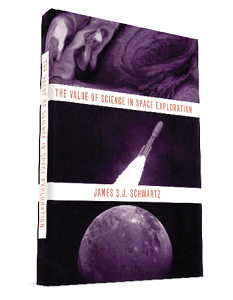At first sight, technical readers would question even the title of this book: ‘well, of course science has a value in space exploration; science is what it all began with, isn’t it?’. But we techies have to remember that ‘space exploration’ (in the broadest sense of the term) is now more than 60 years old and an intrinsic part of global culture; as such, we must allow others to discover it, appropriate it and make sense of it in their own way.
This is effectively what the author, a philosophy academic, is attempting with this book. His “overarching argument”, he writes, “is that space science is uniquely epistemically and ethically valuable, and that this value should play a foundational role in thinking about space policy, regulation and spaceflight objectives”. Few of us would argue against the importance of space science in gathering knowledge, even for knowledge’s sake (the epistemological point), though we non-specialists sometimes get a little woolly over ethical diatribes.
That said, when he ditches the impenetrable jargon of his field, Schwartz is direct and plain-speaking. He begins by critiquing the standard “space advocacy package” that preaches the “need to explore space to save humanity from extinction” or “avoid societal stagnation” or even “inspire student interest in the sciences” – so he is stepping on hallowed ground here! This advocacy, he continues, is “severely lacking in quality and rigor… almost as if it is a tradition, or a tenet of some kind of spaceflight religion”. So that’s our cover blown then.
Despite initial appearances, the author is himself a space advocate, particularly when applied to space science research. Individual chapters cover rationales for space exploration, the intrinsic value of knowledge and aspects such as space resource exploitation, space settlement and planetary protection. The volume concludes with references, an index and a 25-page appendix on “degree conferral and federal funding” (you’ll have to read the book to find out why!).
The author’s ultimate conclusion is that science “should be prioritised over other spaceflight objectives”, which will not sit well with many readers. However, this is not a reason to ignore the book, as it provides a welcome and instructive opportunity to view one’s chosen field from a different perspective. Certainly, philosophers have a lot to learn about ‘space’, but knowledge transfer is a two-way street.











